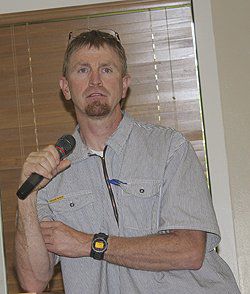The Emery County Business chamber bimonthly Lunch and Learn focused on drugs and the workplace. Julie Jones, chamber president welcomed everyone. Wade Allinson from the Emery County drug task force was the main speaker. Emery Telcom was the luncheon sponsor and Jared Anderson from Emery Telcom said the company is working on fiber builds. It’s important for businesses in the community to be able to have high speed data transfers. Emery Telcom will help businesses streamline their costs to take advantage of all technology Emery Telcom has to offer. These fiber builds will be able to offer the county businesses upgrades and more chances for economic development.
Cindi Avery was the caterer for the Lunch and Learn and the operator of the Lil Country Store in Cleveland. They recently remodeled the store and started cooking hot food to serve the customers better. Connie Jones has worked at the store for 14 years and she’s been a big asset as the store changed owners.
Avery said, “We offer, soup, burgers and specials. We have gas and groceries. I enjoy cooking. I have cooked and catered and owned my own business. We are a grocery and convenience store, we have tables and chairs for the customers. I have two employees and my daughters and grandkids who help with the business.”
Allinson said he works for the Emery County Drug Task Force and the Adult Probation and Parole. He has been involved for 20 years. He likes the perspective of the AP and P, he likes helping the people on probation find jobs and deal with the challenge of being on probation.
Drugs are different than when he started in the 1990s, back then it was meth labs and people cooking meth and situations were very volatile and dangerous. Many law enforcement officers are suffering from the affects of those days and being exposed to dangerous chemicals. The precursor act which took away ephedrone, put an end to most of that activity. Meth is still around, but it’s not as pervasive as it once was. “Prescription drugs are crazy. It would shock you if you knew how much buying and selling goes on. You can buy pills in every town. There is no social boundary to these drugs. It can affect everyone and oftentimes it starts innocently and people get hooked on pain pills after an injury.
“Be watchful of your employees, a lot of drugs are stolen from purses and coat pockets. If someone comes into your home and asks to use your restroom, then be suspicious. Drug users like to go through medicine cabinets. Warning signs also come up when people use multiple doctors. It’s against the law if you have a prescription from a doctor to go to another doctor and get a prescription for the same illness. It’s illegal not to disclose you have a prescription for it. Pharmacies are supposed to report on a statewide data base, who has prescriptions for what drug and who the doctor was.
“If you suspect someone has a problem there are places to get help. You can find a therapist.
“I went to AP and P because I believe people can change. I believe you can overcome addiction. Opiate addictions are hard to overcome.
“Heroin is still around. Ritalin is an abused drug. In kids it’s supposed to slow them down. But, with adults it speeds them up. Kids get involved with fentanyl patches and it’s an opiate patch that time releases into the system. Kids take them and suck on them and it’s very, very dangerous. It’s so strong and kids don’t realize. Check their cell phones. There’s a language for pills, they are called blueberries, cheese and other nicknames.
“A lortab will go for $10 an oxycontin pill for $20. There are people who will buy entire prescriptions, it’s amazing the market that’s out there. If you have someone tell you they are hurting and need a pain med and you happen to have a prescription and you give them a pill that’s illegal and you’re breaking the law. Don’t do it,” cautioned Allinson.
One audience member pointed out, she’s had employees file workman’s compensation claims so they could get pain medication. Allinson recommended all companies have a drug testing policy. Drug testing is really a benefit for the employees. You don’t want employees on drugs operating equipment, it’s dangerous to them, their fellow workers and to the general public. It can also be a liability for an employer.
Allinson said it’s hard to tell who is on drugs. If you have a prescription and you haven’t used it all, call the sheriff’s office and have them pick-up the unused portion so it can be disposed of properly.
Sundays are a big day for thefts that occur when someone walks into your home and goes through the medicine cabinet. Lock your doors. Go in one car and leave a car home, so it looks like someone is home.
You cannot operate a motorvehicle with a metabolite within your system. Be aware this is a crime. If you are using any type of prescription pain medication you could be considered driving under the influence.
People can get help at Four Corners Behavioral Health, there are private counselors, some people may require inpatient care. Some insurances will pay and some billing is done on a sliding scale and some programs are self-pay. There are Alcoholics Anonymous programs and the LDS social services program on Wednesday and Sunday nights.
The state of Utah has information on their website to help an employer set up a drug testing policy for their business.
The next Lunch and Learn will be on July 17 at the Museum of the San Rafael and Mark Holyoak from Castleview Hospital will be the guest speaker. It begins at noon.
Business Chamber learns about drugs/workplace

"Wade Allinson from the Emery County Drug Task Force."
